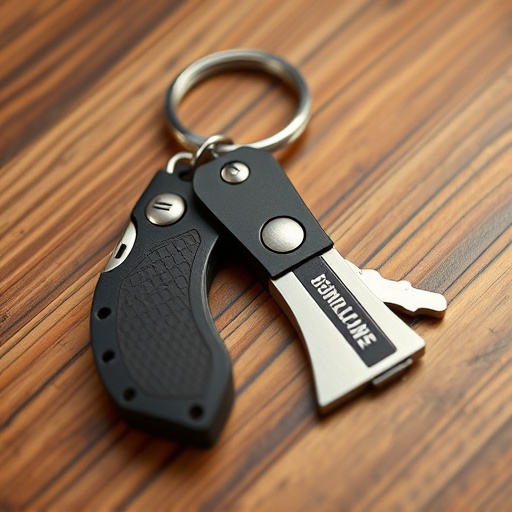Understanding the legal framework surrounding Urban Safety Keychain accessories is crucial for individuals seeking personal protection in urban areas. State laws vary widely regarding design, intended use, and force capabilities, with some permitting open carry under specific criteria while others restrict use to imminent threats. Thorough research is essential to ensure compliance and avoid legal issues. By staying informed about rights and responsibilities, citizens can enhance their personal security while navigating urban environments responsibly.
“In today’s diverse urban landscape, self-defense keychain accessories have emerged as a popular choice for personal safety. However, navigating the legal requirements surrounding these tools can be intricate and varies state-by-state. This comprehensive guide, ‘Understanding Self-Defense Keychain Laws,’ delves into the legal aspects of carrying keychains as defensive instruments, offering a detailed overview for those prioritizing urban safety. Explore state-specific regulations, discover responsible ownership tips, and ensure you’re well-informed about your rights and obligations.”
- Understanding Self-Defense Keychain Laws: A Comprehensive Overview
- Legal Requirements for Carrying a Keychain as a Defense Tool
- State-Specific Regulations and Exemptions You Should Know
- Ensuring Urban Safety: Tips for Responsible Keychain Ownership
Understanding Self-Defense Keychain Laws: A Comprehensive Overview
Carrying a self-defense keychain can be a convenient way for individuals to protect themselves in urban settings, but understanding the legal requirements is essential for ensuring compliance and personal safety. The legality of self-defense keychains varies significantly across different states, with some allowing their use as a last resort while others have stringent rules against any form of hidden weapon. In today’s digital era, where urban safety is a growing concern, knowing these laws is crucial for responsible citizens looking to enhance their personal security.
These regulations often focus on balancing individual rights and public safety. Many states require individuals to act in self-defense or face legal repercussions when deploying such devices. Some even mandate that the keychain must be clearly visible, signaling its intended purpose as a deterrent rather than a concealed weapon. Understanding these nuances is key to navigating the urban landscape with peace of mind, ensuring that your right to self-defense does not compromise the safety of others.
Legal Requirements for Carrying a Keychain as a Defense Tool
In many urban areas, the concept of personal safety is a top priority for residents and visitors alike. Carrying a keychain designed for self-defense has become an increasingly popular choice as a quick and accessible tool to deter potential threats. However, before you invest in an Urban Safety Keychain, it’s crucial to understand the legal requirements that govern their use. Each state has its own set of regulations surrounding the carriage of defensive tools, including keychains, to ensure public safety without infringing on individual rights.
The legality of a keychain as a defense tool depends on various factors such as its design, intended use, and local laws. Some states allow the open carry of self-defense items like keychains if they meet certain criteria, such as having a specific trigger mechanism or being designed for non-lethal force. Others may restrict their use to situations where there is an imminent threat, requiring individuals to justify their possession during routine activities. It’s essential to research and understand these legal nuances to ensure compliance and avoid any potential issues.
State-Specific Regulations and Exemptions You Should Know
In the realm of urban safety keychain accessories, state-specific regulations play a pivotal role in determining what’s legal and what isn’t. Each U.S. state has its own set of laws governing self-defense tools, including keychains designed for personal protection. Understanding these local laws is essential, as they can vary widely from one state to another. For instance, some states allow any individual over a certain age to carry a keychain with a built-in defense mechanism, while others require permits or have stringent restrictions on the type and size of such devices.
Exemptions are another crucial aspect to consider when navigating urban safety keychain accessories laws. Many states offer exemptions for self-defense tools carried by individuals in specific professions, such as security guards or law enforcement officers, who often rely on specialized keychains for their daily duties. Additionally, some states may grant exceptions for certain types of self-defense mechanisms, like pepper spray or stun guns, when carried in compliance with specified regulations. Being aware of these exemptions can help ensure you’re acting within legal boundaries while enhancing your personal safety.
Ensuring Urban Safety: Tips for Responsible Keychain Ownership
In urban settings, ensuring personal safety is a shared responsibility, and the right self-defense keychain can be a handy tool for individuals navigating bustling cities. When it comes to legal requirements, understanding local regulations about carrying self-defense devices like keychains is paramount. Many states have specific laws governing the type, size, and functionality of these tools to maintain public safety and order. For instance, some states allow only certain types of keychains with limited force capabilities while others may require permits or registration for more robust self-defense accessories.
Responsible ownership involves staying informed about these legal boundaries and using such devices only as a last resort when facing imminent danger. Urban safety is enhanced when individuals prioritize knowledge of their rights and responsibilities, ensuring that the use of self-defense keychains does not inadvertently violate local laws or cause harm to others. Always check with your state’s regulations to be well-prepared and legally compliant while enjoying increased security in urban environments.
In exploring the legal landscape of self-defense keychains, it’s clear that understanding state-specific regulations is paramount for urban safety. By staying informed about legal requirements and adhering to responsible ownership practices, individuals can ensure they are using these handy accessories responsibly and within the law. This comprehensive guide equips folks with the knowledge needed to navigate the legal aspects of self-defense keychains, fostering a safer environment for all.
